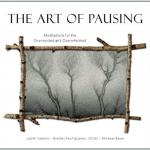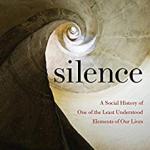 For years now I have loved Psalm 37, for it includes one of my favorite verses in all of scripture:
For years now I have loved Psalm 37, for it includes one of my favorite verses in all of scripture:
Take delight in the Lord,
and he will give you the desires of your heart. (Psalm 37:4)
But there’s much more to this Psalm than that one splendid verse, excellent as it is.
I’ve been reading Alexander Ryrie’s Silent Waiting: The Biblical Roots of Contemplative Spirituality, which contains a lengthy chapter called “Waiting for the Lord in the Psalms.” This chapter includes commentary on a number of Psalms, including Psalm 37. It’s always a treat to read scripture commentary from a contemplative perspective, and this book does not disappoint.
On the surface, Psalm 37 seems to be a generic Psalm about how the prosperity of unspiritual people (and the sufferings of those who love God) are temporary, and will eventually be made right in God’s justice. But actually the Psalm goes much deeper than that. Ryrie points out that verses 3, 4, 5, and 7a actually provide four essential keys to living a contemplative life.
So the Psalm really provides us with wisdom teaching on how to enter into contemplative spirituality — and with this in mind, its overall message (how the injustices of the world will be made right in the eternity of Divine justice):
The psalmist’s main point is that, when one is confronted by the prosperity of the wicked, the most important thing is not to ‘fret,’ but to adopt a certain attitude toward God, and to enter a particular kind of relationship with him.
I think this has application far beyond having to deal with the temporal injustices that we encounter here and now. Indeed, any kind of suffering can be more easily endured (or perhaps even transformed) when we “enter a particular kind of relationship” with God — that is to say, a contemplative relationship.
But what, then, are the four keys to a contemplative life?
Following verses 3, 4, 5, and 7a, they are:
- Trust in the Lord, and do good (verse 3);
- Take delight in the Lord (verse 4);
- Commit your way to the Lord (verse 5);
- Be still before the Lord, and wait patiently for him (verse 7).
Let’s take a closer look at each of these in turn.
Trust in the Lord, and do good.
I love how the Psalmist doesn’t begin with contrition or compunction — that is to say, feeling sorry for your sins — but rather with trust as the essential first step into contemplation. In her Revelations of Divine Love, Julian of Norwich echoes this: she says that God gives us “true prayer and steady trust and God wants us to be generous in both alike.” To enjoy the blessings of contemplative prayer, we need to be generous with God in our prayer (take time to pray), but also generous in our trust (lavishly cultivate faith and hope).
A corollary to trust, is doing good. The contemplative tradition has from the beginning insisted that cultivating a virtuous life is essential for anyone who seeks to enter the mysteries. Clearly, this principle has its roots all the way back in the Psalms.
Take delight in the Lord.
The Hebrew word that gets translated here as delight, וְהִתְעַנַּג, is a delicious word — it means not only “take delight in,” but also “take pleasure,” “indulge,” “have fun.” It’s a deeply sensual word — for example, Isaiah uses this word when exhorting his audience to find joy in Jerusalem, comparing the holy city to a nursing mother:
That you may nurse and be satisfied
from her consoling breast;
that you may drink deeply with delight
from her glorious bosom. (Isaiah 66:11)
It’s a word that carries connotations of daintiness, of being pampered and indulged. God wants us to enjoy God… in a spiritual way that is comparable to how lovers enjoy one another.
This only makes sense; after all, this is the same God whom the mystics kept comparing to the bridegroom in that classic erotic poem, The Song of Songs!
Commit your way to the Lord.
But there’s more to the contemplative life than just indulging ourselves in the pleasures of God. The next step: make a commitment. A commitment to God, of course, but also a commitment of your way to God. Give your life to God. Let God direct your path, and lead you in all areas of your life. Is this easy to do? Of course not. And yet, this is the call of the contemplative life.
Be still before the Lord, and wait patiently for him.
Finally, we get to a verse that echoes a more famous verse in the Psalms, 46:10: “Be still and know that I am God.” But here we are not only enjoined to be still before God — obviously a very static concept — but also to wait patiently, suggesting that the stillness of contemplation is not something that we just devoted few seconds or a few minutes to, and then we’re done. This stillness will become a defining feature of the contemplative’s prayer life. Waiting — patiently waiting — is the heart of contemplative silence. It is the crowning spiritual practice of a holistic way of life that encompasses trust, delight, and commitment.
Putting Psalm 37 into practice.
So how do we put these four keys into action? And really, since two of them are “two-parters,” we could say there are six essential steps here: 1. Trust God; 2. Do good; 3. Take delight in God (yum!); 4. Commit your life to God; 5. Be still; 6. Wait patiently. Just a few thoughts:
First, I don’t know that there is any magic in the sequence. In truth, any of these steps is a lifetime challenge. Don’t feel like you have to wait until you have “mastered” trust before you can delight, or until your delight is satiated before you can make your ultimate commitment. You might be waiting for a very long time! I think the invitation here is to take each of these keys seriously, and to begin cultivating all of these spiritual commitments, more or less simultaneously. Cultivate trust. Cultivate goodness. Cultivate delight. Cultivate commitment. Cultivate stillness. And cultivate patient waiting.
Next, allow the process to be messy and imperfect. We all make mistakes, and so our journey into contemplation will likewise be rough around the edges. I know that I, for one, am not very good at trusting, I often fail to do good, I’m often too distracted or self-absorbed to truly delight in God, my commitment is spotty at best, and my waiting stillness tends to be full of distractions. But God does not ask perfection of us, rather simply faithfulness and perseverance. Don’t be discouraged, but rather keep returning to the contemplative call.
Finally, remember that the greatest of journeys begins with a single step. Just finding one way that you can exercise greater trust in God, or one good deed that you can accomplish, can get the process rolling. And keep taking steps, one step at a time. Be bold. Trust, do good, take delight, commit yourself. And then be still. And wait.
And breathe.
Enjoy reading this blog?
Click here to become a patron.


















